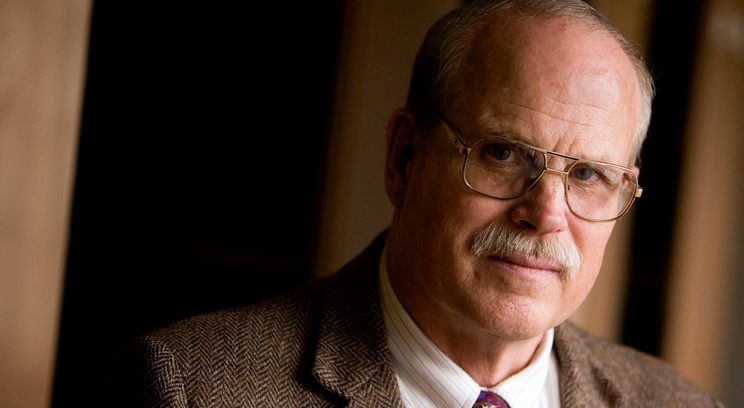Death and the Afterlife? I thought to myself, with uncharacteristic hesitation. Is this really the topic I want to spend my semester studying?
In February 2014, I found myself seated with 20 other students who had likely asked themselves the same question. Yet despite fleeting reservations and a lot of careful thinking about what I could learn from a class focused on what humans don’t know and can’t prove with science, I was convinced that this was the place to be.
I also knew that taking this class would help me in a practical way, by opening up a dialogue about death, which until that point, was unfamiliar to me.
What I didn’t know is that Dr. Terry Nichols’ course would teach me how to live, and live well.
We stared inquisitively at the front of the room, waiting for his first words.
"Good afternoon!" Dr. Nichols bellowed with gusto and self-assuredness. We murmured awkwardly. He tried again, with a hint of impatience at our failure to echo the courtesy. "Good afternoon!" he said, louder. We answered, startled. He commanded our attention, and I immediately appreciated his style.
We began with a get-to-know-each-other activity, weaving through the rows and sharing names, majors and year in college. After a few minutes, we finished and looked up at him expectantly. Dr. Nichol’s surveyed the room, as if to say, "My turn."
"I have cancer," he said. He went on to explain that he might have to miss some classes after chemotherapy. Then he moved on to the syllabus. Not only was this declaration nonchalant, it was unusual to the extreme, especially given the topic of the course.
This is incredible, I thought to myself. How can someone battling for life right now stand before us and discuss mortality?
The following weeks answered that question. Dr. Nichols was an extraordinary man with extraordinary courage and a passion for knowledge. He was consumed with curiosity about the world around him, and he simply had to share it.
We studied world religions, and how the cultures associated with them handle death. We read countless chapters on everything from Buddhist monks to Jewish burials, from pilgrimages to Mecca to the properties of grace. There were memoirs about near-death experiences and recorded interviews from theology scholars. We pondered purgatory and discussed how to die well. We asked questions about science and its compatibility with faith.
Yet what sticks with me was our first book, Mitch Albom’s Tuesdays with Morrie. In it, Morrie, a brilliant professor much loved by his classes for his spunk and charm, is reunited with one of his former students, who is now hardened by the world and searching for meaning in life. The two sit together week after week as Morrie dies from ALS, a debilitating illness that results in degeneration and paralysis of muscle. In one final "class," they discuss the big topics in life.
As a class, we worked through the text, page by page, discussing the various themes and ideas, but Dr. Nichols dwelled on one theme longer than the rest.
"The truth is, once you learn how to die, you learn how to live," he read to us from his usual spot, perched on the edge of his desk in the front of the room.
He paused, looking up at us. "What do you think?" he asked, an intense expression on his face. At the time, I was unsure. While my classmates had a few ideas, our collective understanding of Morrie’s wisdom had a long way to go.
On April 12, a month before the end of the term, Dr. Nichols died.
More than a teacher, he helped me understand that the ultimate goal of this life is to be constructive; value every moment and simply love the people around you. His own life was an example of how to acknowledge our brief time here and make the most of it.
In pondering our own mortality, we discover how to live fully and love wholeheartedly. When we die, our "mission" is complete; we have loved and contributed.
At the time of this writing, the semester still presses on. And I am changed for the better. Dr. Nichols and his passion for seeking the truth will have an immeasurable impact on the lives of 21 students who had the courage to join him on this exploration of death and the afterlife.
Ask any one of us, and we’ll tell you that it was life-changing.
By my own definition, he has loved and contributed, in so many ways. And he will be missed.
In the last chapter of his book, Death and Afterlife, Nichols writes, "For I am convinced that neither death, nor life, nor angels, nor rulers, nor things present, nor things to come, nor powers, nor height, nor death, nor anything else in all creation, will be able to separate us from the love of God in Christ Jesus our Lord." (Romans 8:38-9)
Because of Dr. Nichols, I’m convinced of that, too.
Read more from St. Thomas magazine.


